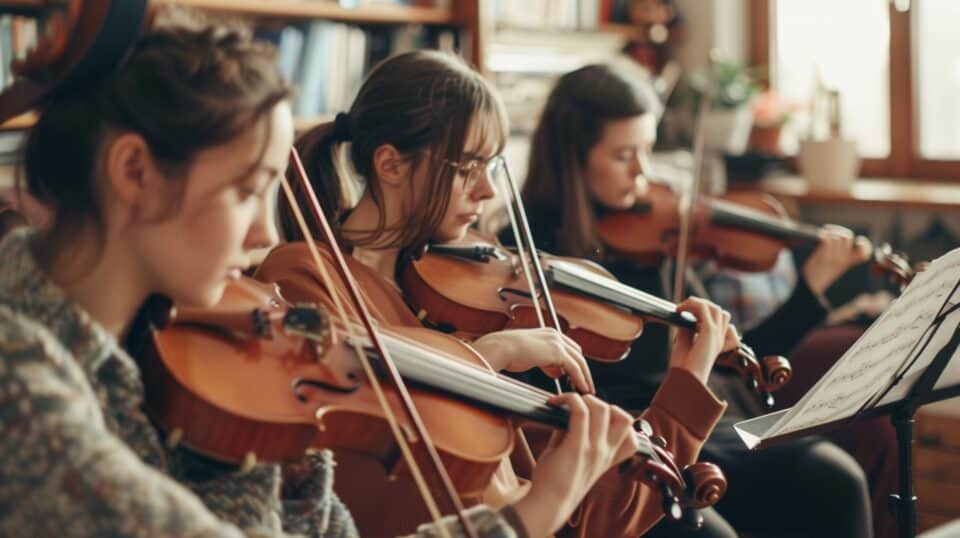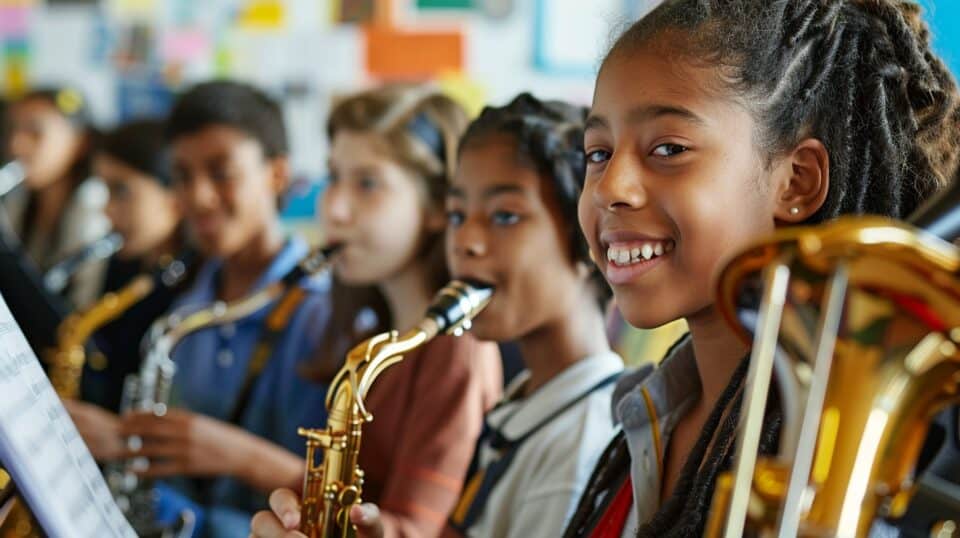Are you looking for a fun and rewarding hobby that can boost your mental and physical well-being? Learning to play a musical instrument is a fantastic choice. Studies have shown that musical training can enhance brain function and memory.
This blog post will explore the incredible benefits of learning instruments for your mind and body – buckle up, it’s going to be an eye-opening ride!
Key Takeaways
Learning an instrument provides numerous mental benefits like boosting brain function, enhancing memory capability, cultivating creativity, strengthening concentration, and improving listening skills. Studies show musicians have higher grey matter volume in brain regions responsible for visuospatial ability, working memory, and motor planning.
Playing an instrument offers emotional and psychological advantages such as reducing stress levels, building confidence, enhancing emotional perception, and promoting happiness. It activates the brain’s calming centers and triggers the release of feel-good chemicals like dopamine.
There are social and academic benefits associated with learning an instrument. It expands your social network, improves academic achievements by enhancing skills like reading, comprehension, and math abilities develops performance skills, and exposes you to new cultures.
Learning an instrument has physical benefits as well. It improves coordination, enhances dexterity, strengthens the immune system by increasing the production of immunoglobulin-A antibodies, and improves posture by engaging the body and requiring good positioning.
Music appreciation has a lifelong impact. Elderly musicians retain cognitive sharpness, memory prowess, and problem-solving abilities due to their musical journey. Group music-making fosters lasting bonds and social vibrancy, combating loneliness among seniors.
Table of Contents
Mental and Cognitive Benefits of Learning Instruments

Learning an instrument is a gateway to unlocking your mind’s potential. It awakens dormant areas of the brain, igniting cognitive fireworks. Mastering a double bass bow can be a thrilling adventure!
Engaging with music stimulates multiple brain regions simultaneously. It’s a whole-brain workout that flexes your mental muscles. So, get ready to explore uncharted territories of cognition – the benefits are profound.
Engaging with music stimulates multiple brain regions simultaneously. It’s a whole-brain workout that flexes your mental muscles. This engagement doesn’t stop at just playing the instrument; it extends to understanding and choosing the right equipment. When searching for double bass bows for sale, the musician embarks on a journey of discovery, learning about the different types of bows and how each can impact their sound and style. This process is an integral part of the learning experience, enriching both cognitive and practical aspects of musical education.
So, get ready to explore uncharted territories of cognition – the benefits are profound. The journey of mastering the double bass, along with the careful selection of tools like bows, promises a rewarding adventure that enhances your mental acuity.
Boosts Brain Function
Learning an instrument is a symphony for the brain! Playing engages multiple areas simultaneously – auditory cortex processes sound, visual cortex reads notes, motor cortex controls movements.
This cross-modal experience creates new neural pathways, improving cognitive abilities like problem-solving, memory, and processing speed. It’s a full-body workout for those grey cells!
Many studies reveal musicians have higher grey matter volume in brain regions governing visuospatial ability, working memory, and motor planning. Their brains are simply… fitter. So pick up that guitar or violin – every practice builds stronger neural connections, sharpening your mind as those melodies flow.
Enhances Memory Capability
On top of boosting brain function, learning an instrument supercharges memory capability — it’s like having a personal trainer for your mind! Think about it… musicians constantly memorize complex patterns, melodies, and lyrics.
This mental workout builds strong “muscles” for recalling information. Numerous studies confirm that musicians possess better auditory memory and visual memory compared to non-musicians.
It makes sense — music reading and playing requires focused attention to details like pitch, rhythm, and notation. This intense concentration trains the brain to store and retrieve information more efficiently.
Cultivates Creativity
Learning an instrument, whether a violin, double bass, or any other, unlocks creative pathways in your child’s mind. It’s an engaging hobby that exercises both hemispheres, fostering imagination – kids compose their own melodies, improvise during playtime.
New neural connections form as they grasp music theory concepts, enhancing problem-solving abilities.
Additionally, playing an instrument encourages out-of-the-box thinking. Kids learn there are multiple ways to interpret a piece, to imbue it with their unique emotions and perspectives.
Strengthens Concentration
Undivided focus—that’s what playing an instrument demands. It sharpens your ability to zero in, to block out distractions. Kids find it easier to concentrate during class, on homework… even daily chores become more manageable.
Developing concentration skills pays dividends across life.
Wanna know a cool fact? Studies show musical training can enhance auditory attention and working memory in children. So while your kid’s jamming away, they’re flexing cognitive muscles vital for academic success.
Improves Listening Skills
Learning an instrument sharpens your listening aptitude – you develop a nuanced ear for pitch, tone, and rhythm. It pays dividends across life; tuning into subtle details during conversations, appreciating music on a deeper level.
Plus, honing your listening prowess boosts concentration – invaluable for academic or professional success.
Playing an instrument engages your auditory processing faculties intensely. You become hypersensitive to sonic textures – dissecting melodies, harmonies, articulations. This translates into stronger focus… better comprehension of lectures, meetings, or dialogue.
Emotional and Psychological Advantages

One of the incredible advantages of learning an instrument is its ability to reduce stress levels — playing music can be an incredibly therapeutic experience, allowing you to channel your emotions in a positive way.
Additionally, learning an instrument can boost your confidence and self-esteem — mastering a new skill and showcasing your talents can be incredibly rewarding.
Reduces Stress And Builds Confidence
Reduced stress levels are just the start—learning an instrument fosters self-confidence too. Sticking with practice, mastering challenging techniques, it all boosts self-esteem… you’re achieving goals, feeling that sense of pride.
And performing in front of others, even informally for family, builds courage. Kids gain poise, learn to handle butterflies—skills that’ll serve them well presenting projects, giving speeches down the road.
Plus, music lets self-expression shine through. There’s freedom in interpreting a piece your own way. That creative outlet nurtures confidence in one’s unique talents, perspectives.
Enhances Emotional Perception
Learning instruments bolsters emotional awareness – cultivating a deeper connection with feelings. Through music’s expressive power, you gain insight into diverse emotions… conveying joy, sorrow, excitement.
This sharpens your capacity to comprehend others’ moods – promoting empathy, a vital life skill.
Playing an instrument positively impacts mental health. Rhythmic patterns and melodies trigger the brain’s reward pathways, releasing feel-good chemicals like dopamine. This improves mood, reduces anxiety – powerful allies against depression, loneliness.
It’s a therapeutic outlet for channeling emotions constructively.
Promotes Happiness
Nurturing happiness isn’t a one-size-fits-all endeavor – learning an instrument offers a delightful path. As your child develops mastery, their self-confidence soars… and the joy of creating music? Priceless! Plus, joining a band or ensemble expands their social circle – forging connections through shared passion.
Music transcends language barriers, fostering a sense of community. And let’s be real, who doesn’t love a lively jam session? Laughter, camaraderie – instruments have a knack for cultivating joy.
So, encourage your kid’s musical journey – it’s an investment in their emotional well-being.
Social and Academic Benefits

Learning an instrument can expand your social network — you’ll meet like-minded people who share your passion. Plus, it can boost your academic achievements and develop crucial performance skills…
Want to know more incredible benefits? Keep reading!
Expands Social Network
Learning an instrument expands your social circle – it connects you with musicians, instructors, and enthusiasts who share your passion. You become part of a community, forging bonds over shared experiences, jam sessions, and performances.
An instrument is a social passport, unlocking opportunities for collaboration, camaraderie, and lifelong friendships.
Music transcends barriers – age, background, you name it. Joining a band, orchestra, or ensemble allows you to meet diverse individuals united by the universal language of music.
Improves Academic Achievements
Playing an instrument boosts academic performance – studies show music training enhances skills like reading, comprehension, and math abilities. Students who learn an instrument often outperform peers in standardized tests.
Music engages multiple brain regions – it’s a whole-brain workout! This cross-training develops cognitive abilities… critical thinking, memory recall, problem-solving. An ideal supplement to traditional academics.
Plus, the discipline of regular practice cultivates vital skills like focus and perseverance. Improving academic achievements paves the way for social and emotional advantages.
Develops Performance Skills
Mastering an instrument fosters confidence—performing solos, recitals, or joining ensembles helps overcome stage fright. Kids gain poise, learn to manage nerves under pressure. It’s an invaluable life skill—presenting ideas, public speaking.
Plus, playing music nurtures discipline, commitment. Consistent practice builds perseverance—vital for future success, academic or professional. Parents, encourage your children’s musical pursuits—the benefits transcend just playing notes.
It equips them with abilities to thrive on any stage, literal or metaphorical.
Exposes to New Cultures
Moreover, mastering an instrument offers a delightful gateway into diverse cultural realms. As you explore different genres and styles, your musical journey unveils the rich tapestry of traditions woven into each piece.
Immersing yourself in the melodies and rhythms of far-flung lands transports you beyond borders — a harmonious passport to broaden your horizons.
Joining a musical ensemble further amplifies this cultural exchange. You’ll forge connections with fellow musicians from myriad backgrounds, creating a symphony of perspectives. Through shared passion and collaborative artistry, these cross-cultural encounters nurture understanding, empathy, and an appreciation for our global community’s vibrant mosaic.
Physical Benefits of Playing Instruments

Playing instruments improves coordination – it’s a full-body workout involving eyes, hands, and breathing. It also enhances dexterity – your fingers get a serious workout, strengthening fine motor skills.
Improves Coordination
Picking up an instrument like the flute develops coordination – it’s a workout for the brain and body! You use precise finger movements to play notes. Simultaneously, you’re coordinating hands, eyes, breathing.
It’s multitasking at its finest. Over time, this boosts dexterity, hand-eye coordination..even boosts reaction times.
Parents often ask, “Why learn an instrument?” Boosted coordination is a key perk! Playing instruments requires complex movements – fingering, breathing techniques, reading music.
Enhances Dexterity
Hand-eye coordination, precise finger movements—these get a major boost from playing an instrument. It’s like a workout for your hands and brain connection! Every pluck, strum, or keystroke strengthens those neural pathways.
You’re training your muscles and mind to sync up seamlessly.
And let’s be real—dexterity comes in handy for all kinds of tasks beyond music. From tying shoelaces to typing on a computer, having that fine motor control is golden. So hey, those guitar lessons? They’re giving your kids an edge for everyday life, too.
Bolstering dexterity translates to gains in sports, art projects—you name it!
Strengthens the Immune System
Playing an instrument has a remarkable ability to strengthen your immune system—yes, you read that right! Studies show it increases the production of immunoglobulin-A, an antibody that fights off infections and illnesses.
Music is truly medicine for the body.
So, grab that guitar or dust off the old clarinet—it might just keep the doctor away! Plus, less sick days means more music-making. Now, that’s a win-win for any parent.
Improves Posture
Learning an instrument is a form of physical activity that engages your body — it requires good posture and proper positioning. This improves overall spinal health, reduces back pain.
Correct posture strengthens core muscles, aligns your body better. It prevents muscle strain in the neck, shoulders, back. Proper positioning develops hand, arm strength — enhancing coordination, muscle control.
An upright posture improves breathing, increases lung capacity too. Developing body awareness through instrument playing? A significant perk.
Improving posture leads to better physical coordination — pretty neat, right? Maintaining good form reduces tension, discomfort. You’re essentially working those muscle groups without realizing it! The real kicker? Proper positioning enhances muscle strength and flexibility over time.
The Lifelong Impact of Music Appreciation

Appreciating music transcends age – it’s a lifelong gift. Studies reveal elderly musicians retain cognitive sharpness, memory prowess, and problem-solving abilities – thanks to their musical journey.
It exercises brain pathways and emotional centers… keeping minds nimble, hearts happy. Plus, group music-making fosters lasting bonds and social vibrancy – combating loneliness, a common struggle for seniors.
So encourage your kids’ musical passion – it may enrich their twilight years with mental vigor, cherished memories, and community ties.
Another perk? Music engages multiple brain regions simultaneously – making it a phenomenal cognitive workout. It bolsters focus, auditory processing, memory encoding… honing skills useful in any pursuit.
A musical background equips one with invaluable tools: discipline through practice, patience, self-expression. These reinforce qualities like resilience, emotional intelligence – assets benefiting all life stages.
So while kids gain an engaging hobby now, they’re also cultivating lifelong advantages. It’s a gift with compounding returns – mentally, emotionally, socially.
FAQs On The Benefits of Learning Instruments
How does playing an instrument help with stress and anxiety?
Playing an instrument is like a natural stress-buster! Studies show it lowers cortisol levels (the hormone linked to stress) and reduces symptoms of anxiety disorders. So if you’re feeling anxious or overwhelmed, pick up that guitar or flute — it’s like a healthy, enjoyable alternative to popping pills.
Can learning an instrument boost brain power?
You bet! Learning an instrument is a full-body and mind workout. It increases brain plasticity (the brain’s ability to change and adapt), sharpens memory, and even improves executive functions like planning and problem-solving. Who knew jamming on the drums could make you smarter?
How does music help with emotional health?
Music speaks directly to our emotions in a way few things can. Playing an instrument allows you to explore and express a wide range of emotions in a healthy way. It can lift your mood when you’re down, help you process anger or grief, and just make you feel more positive overall.
Are there social benefits to playing music?
Definitely! Music brings people together. Playing in a band or orchestra helps build teamwork, communication, and leadership skills. And for kids, being involved in music can boost their confidence and social skills. It’s a fun way to make new friends who share your passion.
Can learning an instrument benefit physical health too?
You bet — playing an instrument is an unexpected workout! Wind and brass instruments improve breath control and lung capacity. Stringed instruments strengthen hand muscles and dexterity. And just the act of sitting upright with good posture while playing works your core muscles. Talk about a full mind-body experience!
How can music benefit older adults?
For seniors, playing music can help delay age-related mental decline and even reduce the risk of dementia. It stimulates the brain, improves hand-eye coordination, and provides an enjoyable social outlet to stay engaged. Plus, music therapy has been shown to ease symptoms of Parkinson’s, stroke recovery, and more. It’s like a fountain of youth for the mind and body!



